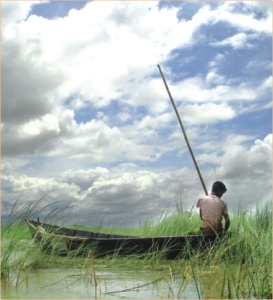|
Seo Master present to you:
We were out of Dhaka crowd and the spell of month-long scorching heat. We drove down to the Mawa ghat through the smooth metalled road under the cover of gray cloud and occasional friendly drizzle. Before us, the mighty Padma River was flowing as it was thousands of years ago. This part of the river is bifurcated into two channels making a huge island in the middle and the two branches joined again.  We were on a newly-built wooden boat 'Panshi Nao,' a name chosen from its traditional design. As we settled comfortably on top of the boat's hood, it started moving with much noise from the engine. We were on a newly-built wooden boat 'Panshi Nao,' a name chosen from its traditional design. As we settled comfortably on top of the boat's hood, it started moving with much noise from the engine. We were cruising on the smaller branch of the river but strong wind created huge waves that rocked our boat. Though we had some life jackets, the waves made some of us a bit worried. But soon the worrying time was over and all of us started singing suppressing the whirring of the engine. Mr Alam and Mr Maroof of JABA Tours, our host of the trip, were always busy looking after us. Soon then joined the chorus.  The weather was not photographer-friendly as most of them hate such lighting condition, but surely it was perfect for the outdoor-loving tourists. The condition was ideal for the autumn Padma landscape as if came out of poems of Tagore who used to spent quite a long time on the river. Apart from the mechanised boats, small dinghis were plying here and there. The colour of sky and water became dirty gray and the horizon could only be defined by the lines of lush green vegetation. After an hour or so, out boat anchored at the junction of the main course of the river with strong currents. It was time for swimming but the level difference of boat and water made it difficult to drop into the water. Fortunately, Inam volunteered by dropping his inflated boat into the water. Alam dropped down some lifebuoys entangled by a strong rope for the relief of the tired swimmers. One must admit that swimming in swimming pools and free flowing water is always a different experience. Suddenly clouds disappeared and an intense blue sky with brilliant sunlight came out from nowhere. We did not waste time to enjoy the magical moments. We got to swimming, mud-bathing, squeezing through the paddy and jute vegetations and everything that came to our brain. We were tired to our bones and our stomach persuading us to call it the fun. We obliged.
The bone chilling wind whipped our cheeks. We cringed inside our armour of jackets, scurf and caps, seeking some warmth on this winter morning. But that did not help much. The boat moved slowly, like a mother duck. The thud of the engine seemed muffled by the chill, too. Very slowly it cruised down the Balu river and then fell onto Shitalakhya. A thick mist hung around us almost like a mosquito net. This was exactly how you should feel if you dip in a huge cauldron of water mixed with milk. And mists make you feel sleepy. Even in this early morning after a good night's sleep we wanted to doze off. But we knew it was better to stay awake because the mist was sometimes so heavy that we could see nothing beyond a few feet, neither in the rear nor in the front. And that makes the journey dangerous. The Eid was just a few days away and we could see the engine boats moving at high speeds carrying full load of cattle. The cows, red, brown and white, silently approached their perilous end, chewing blissfully. They did not stir much because the overnight chilly journey must have frozen them. The beparis or the sellers snugly sat against each other, colourful scurf tightly wrapped around their head. They looked at us with watery eyes, the chill and the wind had been taking toll on them. We checked time: it was already 10 in the morning. But you could vouch it was six because nowhere could you see the sun. That makes the case for that wonderful, life-giving planet -- how its presence or absence can change our perception about life. We could now see the banks through the haze. Even in this cold morning the women were already there taking dip in the river and washing clothes. Somebody said the water remains warm on the winter mornings, but I found no courage to test the hypothesis. The trees and the paddy fields looked heavily drenched in dew. They all seemed to be cowering with the wind and chill. Everything looked soggy, may be because we felt soggy ourselves. Then came into view a barren field. The hacked away paddy stocks stand like fallen soldiers. A field after harvest always looks so desolate and lonely. Like a purposeless soul. Then you feel even colder inside.
We took a small turn and now could hear somebody, probably a small kid, blaring over the microphone in his shrill voice about a 'huge' cattle market. As we passed by the market, the 'huge' thing turned out to be an affair of five bullocks and no goats. There were more bamboo poles than cows and more lights than men. Suddenly, all these 'huge' cattle markets started popping up on our way. As engine boats loaded with cattle would pass by, the market-wallahs would frantically wave their scurf to lure them to their markets. Hardly anyone would stop. They all want to push closer to the capital where money flies in the air.  We were now in the middle of the Padma. The gray mist had thinned by now but still vision would not find the other side of the river. It was a strange feeling, a feeling of being suspended in the space. You could not make out the sky or the river. It was all same; a singleness of misty existence. Suddenly the surrealism turned more unreal as a n army of gulls and terns with long wings and forked tails appeared on the scene. Where did the terns come from? All the way from the Caspian Sea? Maybe, maybe not. They squeaked as they flew in abrupt angular motions. Their wings batting heavily against the mist. They came close to us, then wandered away. An empty cargo vessel overtook us, heading for the sea. Empty we could guess because the draft showed so. The gulls and the terns took after it, probably in the hope of finding some fish jumping out of water. We were now in the middle of the Padma. The gray mist had thinned by now but still vision would not find the other side of the river. It was a strange feeling, a feeling of being suspended in the space. You could not make out the sky or the river. It was all same; a singleness of misty existence. Suddenly the surrealism turned more unreal as a n army of gulls and terns with long wings and forked tails appeared on the scene. Where did the terns come from? All the way from the Caspian Sea? Maybe, maybe not. They squeaked as they flew in abrupt angular motions. Their wings batting heavily against the mist. They came close to us, then wandered away. An empty cargo vessel overtook us, heading for the sea. Empty we could guess because the draft showed so. The gulls and the terns took after it, probably in the hope of finding some fish jumping out of water. There was this fishing boat bobbing aimlessly with the fishermen struggling to cast a net tied to two long bamboo poles. The boat tipped dangerously on its side. I hoped that it would roll over with the effect of the fishermen taking a good dip in the freezing water. But by some miracle, nothing happened. As our boat neared it we noticed a white rope going straight into the water. It can't be anything but fish. "What's it you got there?" one of us asked. The fisherman pulled up the line and the silver bodies of two big fish flashed -- a boal and a katal. But the drooling of some of our fish lovers stopped on hearing the price -- 1,900 taka for the pair. After a little haggling, we left the fish to their watery world and headed ahead into the nothingness. It was late afternoon and a new layer of cold was descending, freezing the earth. Freezing our heart. It is when the doves would brood quietly on electric wires running above the derelict newly harvested fields, their beaks buried in their puffed feather. It is the time when the Shaliks would look for straws in the barren fields, hopping from one mould of earth to another. It is the time when the field mice would break their sleep and shake the laziness out of their tiny warm bodies. But we could feel a gloom seeping inside us. And then suddenly the sun appeared, almost magically. Through the gray hazy mist, a big round sun hung like a fireball above the Padma. Its shape pixilated by the fog. Its pale colour quavered in vermilion hue. We stood mesmerized. And then a lonely bird, probably a kite, flew in a silhouette across the sun. We felt even lonelier on that Padma evening.
|
Labels: Travel































